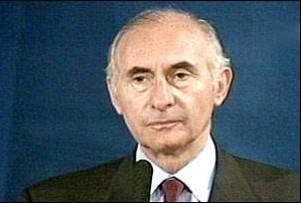Agence France Presse
May 31, 2000
BUENOS AIRES - Tens of thousands of people marched Wednesday through downtown Buenos Aires to protest a new government economic austerity plan, with union leaders calling for a one-day national strike next week. In an unusual move, the protest march was strongly supported by Roman Catholic church leaders, who hold the IMF largely responsible for Argentina's economic malaise.
Waving Argentine flags, the protesters paraded down the streets leading to the Plaza de Mayo and staged a massive rally in front of the Casa Rosada, Argentina's presidential palace.
"Nothing will move in Argentina, not even the leaves on the trees," labor leader Hugo Moyano told the crowd, in calling for a June 9 national strike. Argentina "could derail the financial dictatorship" of the International Monetary Fund, he said, while at the same time urging his countrymen to refuse to pay their taxes.
Organizers said 80,000 people joined the protest, held one day after IMF economists arrived here to review the government's budgetary and revenue accounts.
Never before had a visit of IMF economists sparked such wide-ranging protests, uniting previously divided unions and garnering support from Argentina's Catholic clerics, traditionally among the most conservative in Latin America.
Union leaders used the rally to call for a national strike that would be the largest ever to confront President Fernando de la Rua, who took office in December.
A strike earlier in May, to protest changes to Argentina's labor laws, was supported only by the most militant branch of the powerful General Confederation of Labor (CGT), headed by trucker Moyano. But Rodolfo Daer, who heads a moderate branch of the union, has joined with Moyano for next week's strike, as has Victor de Gennaro, of the Argentine Workers Confederation.
Catholic church leaders have denounced the president's austerity plan, which would raise taxes, reduce social spending and cut the salaries of government employees in a bid to win badly needed loans from the IMF.
Moyano urged Argentines to engage in "fiscal disobedience" by refusing to pay their personal taxes, which already jumped between eight and 22 percent in January — the steepest increase in a decade.
"We are going to be imprisoned, fined. We're going to hit them where it hurts, we're going to call for fiscal disobedience so that Argentines' strength doesn't go to foreign debt," Moyano said.
 De la Rua inherited a public debt of 115 billion dollars from his predecessor, Carlos Menem.
De la Rua inherited a public debt of 115 billion dollars from his predecessor, Carlos Menem.
The IMF has granted Argentina a 7.3 billion dollar loan in exchange for a commitment to keep this year's budget deficit below 4.7 billion dollars. The government had spent nearly half that amount in the first four months of 2000.
The belt-tightening is generally supported by business leaders here, who say the reforms are needed to bolster the economy and create new jobs. Argentina's unemployment rate stands at 14 percent, but another 14 percent of the workforce is underemployed — meaning they have temporary or part-time work that is insufficient to support a single person at the poverty line.
FAIR USE NOTICE. This document contains copyrighted material whose use has not been specifically authorized by the copyright owner. Corporate Watch is making this article available in our efforts to advance understanding of ecological sustainability, human rights, economic democracy and social justice issues. We believe that this constitutes a 'fair use' of the copyrighted material as provided for in section 107 of the US Copyright Law. If you wish to use this copyrighted material for purposes of your own that go beyond 'fair use', you must obtain permission from the copyright owner.